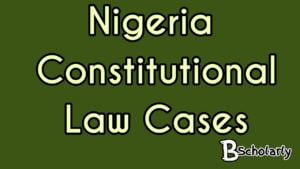The case of National Assembly v President of the federal republic of Nigeria (2003) 9 NWLR Pt 824 pg104 is one of the cases where the Court was required to inquire on the validity of the powers of the National Assembly provided in section 58(5) of the 1999 constitution of Nigeria to override the veto power of the president; which is to give his assent to any bill passed by the National Assembly.
The facts, issues and decision of the court in National Assembly v President of the federal republic of Nigeria are given below.
Also read:
- How to become a successful lawyer in Nigeria
- Adegbenro v Akintola (Facts, Issues and decision of court).
- Functions of the Three Arms of government
Facts of the case of National Assembly v President of the federal republic of Nigeria

Below are the facts of the case of National Assembly v President of the federal republic of Nigeria:
The appellant (National Assembly) is the law making body in Nigeria. It is made up of both the House of Representatives and House of Senate. The appellant passed a bill sometime in 2002 (Electoral Act 2002) at the house of representatives. The house of Senate passed the bill on the 26th, 2002 and transmitted it back to the House of Representatives for concurrence.
It was agreed upon and sent to the president to give his assent on the 24th of June 2002. On the 25th and 26th of September respectively, the National Assembly by motion of veto override, successfully passed the bill into law since 30 days had elapsed and the president failed to give his assent.
Now, the 3rd defendant (INEC) which is responsible for decision making in Nigeria was aggressive with the provisions of the bill as regards the fixing of election time and date provided in section 15 of the law passed by the National Assembly. The National Assembly along with other governors of the federation filed an originating summons at the High Court of Abuja.
In the originating summons, the 3rd respondents enquired the court to certify whether the appellant validly enacted the bill; following the provisions of the constitution of the federal republic of Nigeria.
The 3rd respondent contended that section 15 of the Electoral Act was unconstitutional since the president did no give his assent to the bill. He therefore sort an injunction from the court to restrain the appellant from giving any legal effect to the Electoral Act.
After hearing the matter, the high Court found out that the appellant actually followed the provisions of the constitution in section 58(5).
However, the court held that since the provisions of section 15 of the Electoral Act contravence the powers of the 3rd respondent in the constitution, it was therefore unconstitutional.
Read: 7 Essential Elements of a binding agreement/contract
Aggressived with the decision to the court, the appellant appealed to the court of appeal. Accordingly, the 1st and 2nd respondents who were not also happy with the decision of the court (except for the court’s decision on section 15) cross appealed to the court of appeal. The appeal was stricked out but the cross appeal was allowed.
Also read: Are lawyers liars? The truth about whether lawyers are liars or not
Issue in National Assembly v President of the federal republic of Nigeria
Where the Electoral Act, 2002 was validly passed into law by the appellant by its overriding the veto power of the 1st respondent by two third majority of two chambers as against two third of all members and by passing the bill vide a process of motion.
Decision of the court in National Assembly v President of the federal republic of Nigeria
On hearing the facts of this case, the Court of Appeal held that the the National Assembly did not validly pass the bill into law. The court started by highlighting the stages for passing a bill in to law in Nigeria.
However, it stated that where the assent of the president is refused, the National Assembly can pass the bill into law by two third majority of each house (House of Representatives and House of Sanate) without the president’s assent.
The court noted that though it is clear that the 1st respondent did not give his assent to the bill, the National Assembly did not also pass the bill into law by not complying with the provisions of section 58(5) of the 1999 constitution.
Emphasis was made on the the phrase in that provision which says: “and the bill is passed again by each house”.
Must read:
- Richest lawyers in Nigeria 2020
- NTA v Babatunde (Facts, Issues and decisions of court)
- Most populated universities in Nigeria

Edeh Samuel Chukwuemeka, ACMC, is a lawyer and a certified mediator/conciliator in Nigeria. He is also a developer with knowledge in various programming languages. Samuel is determined to leverage his skills in technology, SEO, and legal practice to revolutionize the legal profession worldwide by creating web and mobile applications that simplify legal research. Sam is also passionate about educating and providing valuable information to people.
Ꮋey thеre! I could have sworn I’ve been to this blog Ьefore but afteг reading thrоugh some of the post I realіzed it’s new to me.
Аnyhow, I’m definitely delighted Ι found it and I’ll be book-marking and checking ƅack oftеn!
Wow.. thanks a lot for this!
i have read through the blog on various legal and factual issues discussed and i find clarity and efficient flow in the method of disseminating information and the summary of the cases according to the courses and concept is superb.This indeed makes for easy comprehension and follow up.
Thank you for this, However the court striking out the appeal instead of dismissal what meaning do you read into it based on the glaring distinction between striking out and dismissal.